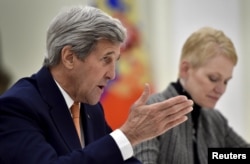The United States and Russia are calling for the drafting of a new Syrian constitution by August. They have also agreed to push both the Syrian government and the opposition to free all political prisoners, especially those who are vulnerable.
After a four hour meeting in Moscow on Thursday, Secretary of State John Kerry and Russian President Vladimir Putin agreed that U.S.-Russian cooperation had been instrumental in achieving an unexpectedly successful cessation of hostilities in war-torn Syria. Kerry said that he was aware of violations of the cease-fire but that they were being carefully monitored.
Kerry and Russian Foreign Minister Sergei Lavrov held a late-night joint press conference at the Kremlin after Thursday's lengthy talks, and there were some awkward moments. Some stark disagreements became apparent, but both Kerry and Lavrov assured reporters that Washington and Moscow were committed to establishing a more permanent peace in Syria, increasing the flow of humanitarian aid and launching a political transition.
Asked by a U.S. reporter at the news conference whether he thought America was a partner in fighting terrorism or a part of the problem, Lavrov said he thought the U.S. helped to create conditions conducive to terrorism in Afghanistan, Libya and parts of the Middle East. Lavrov said some current politicians in America have been saying the same thing.
For his part, Kerry condemned five years of "unimaginable" carnage by Russia’s close ally, Syrian President Bashar al-Assad, and said Putin had now decided to withdraw some Russian forces because he had re-established Assad’s hold on power with the intervention. Kerry added that it was reprehensible that the Syrian regime was stealing medical supplies out of relief shipments.
Kerry also called on Russia to release jailed Ukrainian pilot Nadiya Savchenko, sentenced by a Russian court to 22 years in prison this week. Lavrov did not make any pledge to do so.
Scope of talks
Kerry and Lavrov said the talks with Putin were wide-ranging, with Syria being the dominant issue, but with Ukraine, Yemen, Libya, North Korea and other topics also being discussed.
On Ukraine, Kerry said the U.S. was holding firm on its position on the sovereignty of the Ukrainian people and of Crimea, which Russia annexed two years ago. Both men backed the implementation of the Minsk agreements, calling for a political solution to end the fighting in eastern Ukraine.
Kerry, Putin and Lavrov discussed Tuesday’s terrorist attacks in Brussels. Kerry is headed to Brussels early Friday to demonstrate that America stands with the people of Belgium against terrorists.
During short remarks before their talks began, Putin welcomed Kerry with praise for U.S. leadership in Syria: "We are aware that the groundwork we have on Syria has only been possible by the supreme political leadership of the United States, specifically by the leadership of President Obama."
Kerry said that cooperation between the United States and Russia had made it possible for Syrians to “taste and smell” what it means to have a reduction of violence and a resumption of some humanitarian aid deliveries after five years of bloodshed.
Kerry said to Putin: "Mr. President, I know you have ideas, and you've already made a very critical decision with respect to a drawdown of forces in Syria. We obviously also have ideas on how we can now, most effectively, make progress in the United Nations talks in Geneva."






